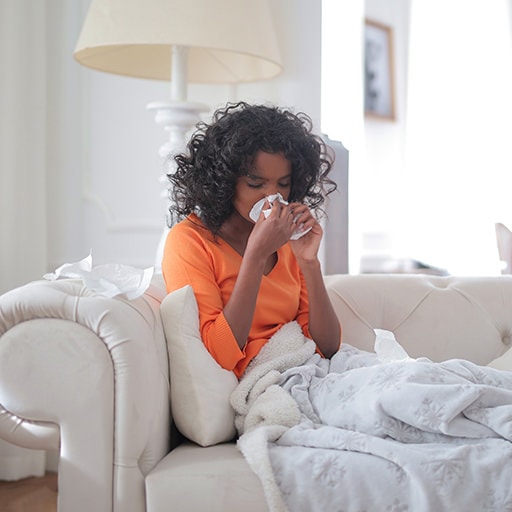Hay Fever Symptoms and Treatments
Written by: Christopher Karam | ✔️ Medically Reviewed by: Dr. Riad M., M.D - G.P and Micheal B., M.D | Last Updated: 2020 June 02
Table of Contents
- Break Down
- What Is Hay Fever?
- The History of Hay Fever
- What Causes Hay Fever Reactions?
- What Worsens Your Symptoms?
- How To Relieve Hay Fever
- Severity and Contagiousness Rating
- Frequently Asked Questions (FAQ)
- Related Articles
- Sources
Break down and Background
What Is Hay Fever?
Hay fever (also known as allergic rhinitis) is an allergic inflammatory reaction in the nose, usually caused by allergens, pollen, and animals.
Rhinitis refers to inflammation and irritation of the mucous membrane in the nose. Hay fever can be a seasonal allergic reaction or a chronic issue.
Unfortunately, hay fever can is a regular occurrence for most people and can affect you at any place and time. It’s commonly triggered when on outdoor walks, at work, at home, or while driving.
Some of the symptoms of hay fever include a runny nose, congestion, asthma, itchy eyes, and sinus pressure. Being well prepared to treat these symptoms is crucial, as symptoms can last between 2 to 8 days.
The most common seasons for hay fever are between March and September, when it’s warm, humid, and when the pollen count in the air is at high levels.
What Causes Hay Fever Reactions?
Unlike colds, which are caused by virus, hay fever is an allergic reaction and begins immediately after exposure to:
Dust
Pollen
Mold
Pet fur or saliva
Smoke
Dust mites or ticks
Indoor allergens
The body’s immune system response causes these symptoms when it detects an allergen as a harmful attack on the body. This response dilates your blood vessels and produces inflammatory chemicals such as histamine, bradykinin, and prostaglandins.
Inflammation can cause mild symptoms such as:
Fever
Runny nose
Headaches
Fatigue
Irritability
Itchy skin
Itchy eyes
Sore throat
Certain people are more prone to hay fever, usually due to a compromised immune system, poor diet, or allergies.
Eating foods high in omega-6 fatty acids can also amplify the effects of hay fever, as omega-6 fats triggers inflammation. Maintaining a healthy diet can drastically help reduce and prevent hay fever.
What Worsens Your Symptoms?
Common household as well as outdoor allergens and irritants can significantly worsen your symptoms of hay fever. Indoor allergens and irritants include:
Dust and dust mites
Pet fur sheddings and skin
Bedbugs
Cockroaches
Mold spores and fungus
Food such as shellfish, crustaceans, eggs, fish, milk, mustard seeds and yellow mustard, tree nuts, peanuts, sesame seeds, and soy produts.
Outdoor allergens and irritants include:
Tree pollen
Grass pollen
Weed pollen
Ragweed and pigweed allergies
Wood
Smoke
Insects
Seasonal changes
How To Relieve Hay Fever
There are many easy to implement ways to prevent hay fever, here actionable suggestion you can take:
Eat a consistent, nutrition-rich, and healthy diet: Eating well can reduce symptoms of hay fever and the likelihood of contracting other allergic reactions.
This strengthens your immune system and minimizes the harmful responses your body produces. Fish oil is high in omega-3 fats which are fantastic for reducing inflammation and promoting heart health.
Clean your living arrangement: Keeping a clean home that’s free of allergens, pet fur, and dust on your furniture or bed sheets can make drastic improvement in reducing the severity and chances of triggering hay fever.
Treating your symptoms: If you’re currently suffering from symptoms of hay fever you can prevent a number of reactions from by taking eye drops to prevent itchy eyes, allergy pills to prevent worsening symptoms, saline nasal rinses to prevent a runny nose, and an inhaler if your symptoms are severe or have asthma.
As hay fever specifically targets the sinus areas, nasal sprays are highly effective treatments. Helping reduce the severity of asthma (in addition to an inhaler) and quickly reduces the severity of rhinitis.
If symptoms worsen always seek help from a medical professional, they can provide specific treatments or medications that are most effective for you.
Severity and Contagiousness Rating
Slightly Severe and Contagious
Hay fever is a mildly sever allergic reaction that is non-fatal in the majority of cases. It’s triggered through the exposure of pollutants and pollen, most commonly include tree pollen, weed pollen, smoke, dust, and dust mites.
Hey fever is very common amoung immunocompromised adults and children. Multiple research papers and studies have shown that improving your immune system strength leads to a reduce chance of getting hay fever.
Fish oil supplements as well as healthy cooking herbs and spices are nutrition-rich foods that can drastically improve your overall health, promote weight loss, and improve your immune system.
Following a good nutrition plan can help you avoid most common illnesses, diseases, and reduce the severity of certain allergic reactions.
Frequently Asked Questions
Yes, hay fever is an allergic reaction that often takes place immediately after exposure to specific allergens.
Depending on the person, these allergens may be different. Outdoors exposure to pollen and weeds are common hay fever triggers.
There are a few ways to relieve hay fever quickly:
1. Use Vasline or Vicks around your nose to trap pollen and avoid breathing it in.
2. Wear sunglasses to avoid having pollens, weeds, and other allergens reach your eyes from outdoor winds.
3. Change clothes and shower often to avoid having any lingering bacteria on your body.
Hay fever is a sudden allergic reaction to allergens that can last between 2 to 8 days. Depending on the person and the severity of the reaction.
This can trigger watery eyes, a runny nose, headaches, fatigue, irritability, or a sore throat.
Hay fever is an allergic reaaction that has quite a few symptoms, similar to the common cold. Symptoms include fever, runny nose, headaches, fatigue, irritability, itchy skin, itchy eyes, sore throat.
Articles and Sources
1. Institute for Quality and Efficiency in Health Care (IQWiG) (2020 April 23) Hay fever: Overview
2. BMJ. (1998 March 14) Summer hay fever
3. Institute for Quality and Efficiency in Health Care (IQWiG) (2020 April 23) Allergies: Overview
5. Br J Gen Pract. (2004 June 01) Hayfever — practical management issues

Search Through Our Site
Related Infections, Diseases, and Illnesses
Common Cold Symptoms and Treatments
Flu Symptoms and Treatments
Asthma Symptoms and Treatments
Autoimmune Diseases Symptoms and Treatments

